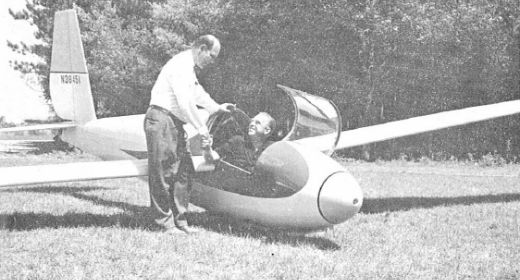
The art of flying on silent wings
Air Facts ArchivesIn our latest trip through the Air Facts archives we share a beautiful meditation on soaring, written by legendary airline pilot Bob Buck. Bob was a pilot's pilot, and his thoughtful, evocative description of what it's like to fly without an engine will make you wish you were soaring with him. Think gliders are for wimps? Think again.

To grandmother’s house we go or no go?
Go or No GoAh, the holidays. A fun time for relaxing with family, right? Maybe, but first you have to get to grandmother's house for the big turkey dinner. And by looking out the window, it's clear that the weather stinks. Are you flying your Baron or staying home?

Veteran’s Story: many ways to die in WWII
Veterans' StoriesA World War II Fighter Group climbs out through 20,000 feet of thick English overcast without autopilot or radar assistance--a harrowing experience at best. The odds against your missing dinner that evening went up considerably if you happened to be the wingman on a leader whose instrument skills were…questionable.

Mission possible: flying starfish
OpinionWhy do I fly? What is it about being in the air that compels me to spend spare time, and even more scarce resources, to pursue aviation? Actually, it’s pretty simple: it’s about sharing my insatiable passion with others.

New FAA medical policy – fixing a problem that doesn’t exist
John's blogIn describing a new policy on obstructive sleep apnea that will soon take effect, the FAA basically put pilots on notice that if you're too fat you might lose your medical. There's no other way to read this outrageous proposal.

Are slow airplanes practical transportation?
Dick's blogIn a posting about the future and the relationship between present and past costs, I referred to transportation airplanes as those cruising at 140 knots or more. At least one reader questioned this and noted the value of slower airplanes for transportation, at least over shorter distances. Was he right?

Veteran’s Story: Vietnam photo ops
Veterans' StoriesIn the fall of 1962, I was a year out of flight training and attached to Heavy Photographic Squadron Sixty-One (VAP-61) home based at NAS Agana, Guam. It turned out that the only capability in the western Pacific for high altitude mapping belonged to VAP-61 and its Douglas RA-3B Skywarrior.

Learning panes – who you are in the cockpit is who you really are
I was thereSometimes you learn things that you didn't expect while looking through airplane windows. I noticed this when I first started to fly and it has become the most beneficial part of the experience. It doesn’t happen on every flight. But it happened again recently.

Proposal for a new IFR certification
OpinionFrom time to time, the FAA changes the qualifications for a license or rating and even adds a new designation of pilot. Steve Phoenix has made a study of the pilot population and gives here his recommendation for a new category of instrument pilots.

You don’t remember, as I do
Veterans' StoriesThis Veterans Day we are honoring those who served by sharing the stories of war in the air, as told by the pilots who were there. Over the next few weeks, we'll publish stories by pilots from World War II, Vietnam and other wars. Some are short, some are long, but all offer a glimpse into the life of a pilot at war.

Weather Flying, fifth edition – the legendary book flies on
Dick's blogWhen Bob Buck’s book Weather Flying was released in 1970, it became an instant classic. Wolfgang Langewiesche said of it, “Other books explain how weather is made; this book explains how weather is flown.” Truer words were never spoken.

This time, it’s cucumbers from the Bahamas
I was thereIn his last Air Facts article, veteran freight pilot Jeff Tait shared his experience flying eggs to Venezuela. In this story, it’s cucumbers from the Bahamas to Florida. Ever think about how those cucumbers end up in your grocery store? Jeff has.

Always trust the GPS?
I was thereI punched the identifier for Tuli Block into my GPS and it came up, instructing me to fly a heading of 273 degrees for 300 miles, which would put us well into the Kalahari Desert searching for a non-existent dirt strip in the bush. Not a good outcome. How could that happen?

Have pilots lost their sense of adventure?
John's blogAlmost everyone today, pilots included, is less spontaneous and less accepting of risk. That's probably a good thing overall (we're living longer), but it's less than ideal for getting the most out of a pilot's license.
